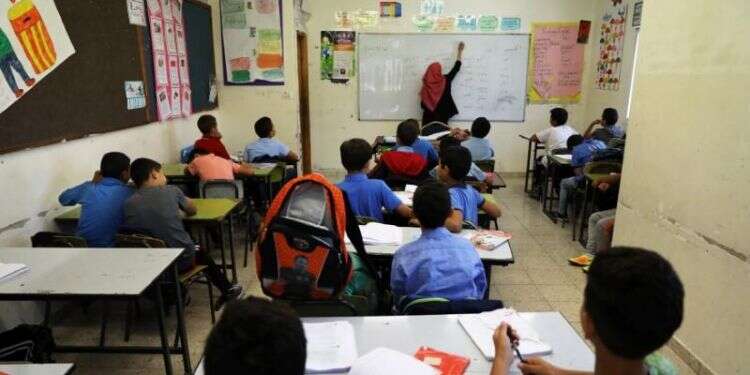A special report published on Thursday by the Jerusalem and Heritage Ministry revealed a new trend: 51% of official schools in east Jerusalem currently adhere to the Israeli educational curriculum – marking a jump of 34% over the past four years.
Follow Israel Hayom on Facebook, Twitter, and Instagram
The number of students in east Jerusalem being taught the Israeli curriculum – which includes preparations for matriculation exams along with subjects such as Hebrew, bible, and civics – is three times larger than prior to the launch of the government's five-year plan.
According to the report, 51% of students in east Jerusalem take the Israeli matriculation exams as opposed to 49% who take the Palestinian Authority's matriculation exams. This spike has come in the wake of a NIS 445 million ($135.9 million) investment – consisting, among other things, of pedagogical and infrastructure incentives – which has aimed to expand the use of the Israeli curriculum in east Jerusalem. This is investment was made within the framework of Government Decision 3790, which passed in 2018, for economic development and minimization of social gaps, at an overall price tag of NIS 2.1 billion ($641.2 million). Additionally, since 2018 the number of students from east Jerusalem studying for an academic degree has doubled.
The report shows that in the past four years, six new schools and 65 new pre-schools have opened in east Jerusalem and that nine new buildings have been rented out for schools using the Israeli curriculum. These schools in the city's east have been connected to high-speed internet networks, have received some 15,000 laptop computers, and have launched 52 technological tracks.
"I passed the unprecedented government decision to minimize the gaps in east Jerusalem, with education, ingraining the Hebrew language and an Israeli curriculum in the schools there being the primary objective," said Ze'ev Elkin, who heads both the Housing and Construction Ministry and the Jerusalem and Heritage Ministry. "The figures emerging from the report are encouraging, and prove that only actions will produce results. Although there's still a lot of work to be done, this is the only way we can improve the quality of life and integrate [the residents of east Jerusalem] in the Israeli labor market."
Netanel Izak, the director-general of the Jerusalem and Heritage Ministry, said, "The key to closing the gaps in the city's east starts and ends with education. The transition to an Israeli curriculum will allow the next generation in east Jerusalem to learn Hebrew, which is the connecting bridge to the rest of Israel. The ministry is spearheading significant cooperation between the Education Ministry and the Jerusalem municipality, which is allowing us to truly revolutionize things in Arab society in east Jerusalem."
Subscribe to Israel Hayom's daily newsletter and never miss our top stories!




